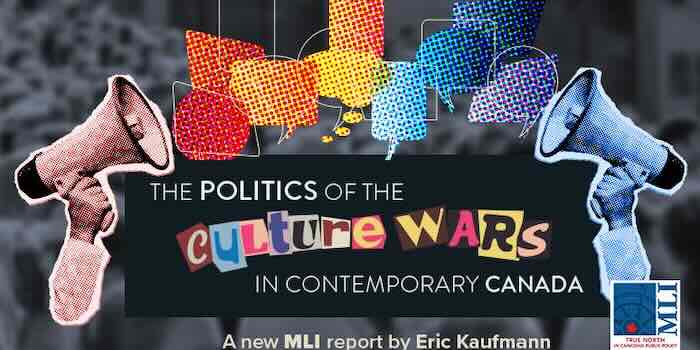By Macdonald Laurier Institute ——Bio and Archives--February 15, 2024
Canadian News, Politics | CFP Comments | Reader Friendly | Subscribe | Email Us

Executive Summary: “Culture wars” refers to the contention between cultural socialism – prioritizing equal results and protection from emotional harm for minority groups – and both cultural liberalism and conservatism, which prioritize free speech, objective truth, due process, and national heritage. Media coverage of this phenomenon has exploded since 2015 across the West, including in Canada.
This report uses a national representative survey fielded by online market research firm Maru Voice Canada on September 18 to 20, 2023. It shows that Canadian attitudes to the kinds of contentious issues that feature in such stories lean about 2 to 1 against the cultural socialist position, and that Canadian opinion is astoundingly similar to that in the United States and Britain.
In addition, while many Canadians believe that French-Canadians have very different opinions on these issues, results show very little variation between Francophone and Anglophone respondents. Internationally, Canada is different in that its voters are more deferential towards elite political culture, with Canadians displaying somewhat higher trust in journalists, teachers, and academics than their counterparts in the Anglosphere.
This said, the structure of Canadian public opinion indicates that there is considerable potential for right-of-centre parties to increase the salience of culture wars issues, and a concomitant electoral risk that liberal and left-of-centre parties must manage.
• Canadian opinion on cancel culture, critical race/history, and transgender issues is almost identical to that in Britain and the United States;
• Canadians are less likely to call their country racist than are Americans or Britons;
• Canadians oppose the idea of separating students in schools by race into privileged and oppressed by 92 to 8;
• Respondents oppose teaching children that “There is no such thing as biological sex, only gender preference” by 85 to 15;
• By an 80 to 20 margin, people oppose attempts to cancel gender-critical feminists J.K. Rowling and Kathleen Stock;
• Canadians oppose gender reassignment surgery for under-16s by 4 to 1;
• By a 78 to 22 margin, Canadians agree that “political correctness has gone too far”;
• By a 70 to 30 margin, Canadians oppose the idea that Canada is a racist country and a similar share do not want this taught at school;
• By 70 to 30, people prefer a colour blind rather than colour-conscious approach to issues in society;
• Canadians oppose removing statues of Prime Minister John A. Macdonald by a 2 to 1 ratio;
• By a 2 to 1 margin, people said we talk too much about race in Canada;
• Respondents, by a 2 to 1 ratio, want parents informed when children under age 16 change pronouns at school;
• Respondents, by a 2 to 1 ratio, do not want transgender women to enter women’s sports competitions;
• More Canadians disapprove than approve of people displaying their preferred pronouns;
• Younger Canadians are considerably more “woke” than older Canadians (i.e., they treat as sacred marginalized race and sexual identity groups, as well as women), though the generation gap is not as large as in Britain or the US;
Support Canada Free Press

• Younger Canadians are substantially less likely than younger Britons or Americans to describe their country as racist;
• Those who have taken diversity training are significantly more fearful of losing their job or reputation for what they say than those who have not;
• Those who have taken diversity training are significantly more woke than those who have not;
• Heavier social media users are significantly more woke, even controlling for ideology, age, and numerous other factors;
• 60 percent of Canadians believe that “215 indigenous residential school children were buried in a mass grave on school grounds in Kamloops, BC,” with just 15 percent disagreeing;
• 39 percent of Canadians and 55 percent of Americans believe that “Native peoples lived in peace and harmony prior to European settlement” of their countries;
• Francophone attitudes are generally very similar to Anglophone attitudes on culture war questions;
• Francophones are less likely than Anglophones to defend Anglo-Canadian historical figures such as Macdonald or Egerton Ryerson and are less concerned about threats to free speech or about political correctness;
• Francophones are more skeptical than Anglophones of gender ideology and colour-conscious equity and diversity policies;
• Canadians are 3 times more trusting of journalists than are Britons and over 50 percent more trusting of them than are Americans;
• These results suggest that conservative parties can gain electoral support by defending historical figures and symbols and resisting trans activist policies. Parties on the left are advised to deflect or defuse such issues as they may prove electorally costly; and
• Results indicate that diversity training, as currently practiced, needs to be reformed or abolished in organizations as it heightens employee anxiety and advances contentious beliefs.
View Comments
Canada’s only truly national public policy think tank based in Ottawa. MLI is rigorously independent and non-partisan, as symbolized by its name. Sir John A. Macdonald and Sir Wilfrid Laurier were two outstanding and long-serving former prime ministers who represent the best of Canada’s distinguished political tradition. A Tory and a Grit, an English-speaker and a French-speaker, each of them championed the values that led to the creation of Canada and its emergence as one of the world’s leading democracies and a place where people may live in peace and freedom under the rule of law.